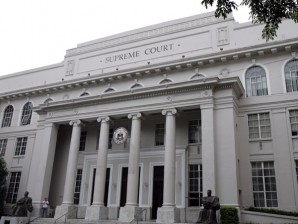SC reminds aspiring public officials to renounce foreign citizenship
MANILA, Philippines—The Supreme Court reminded those aspiring for public office to first renounce their dual citizenship or they will be disqualified.
“Failure to renounce foreign citizenship in accordance with the exact tenor of Section 5(2) of Republic Act (R.A.) No. 9225 [Citizenship Retention and Re-Acquisition Act of 2003] renders a dual citizen ineligible to run for and thus hold any elective public office,” the high court said in a 24-page decision dated Sept. 6, 2012 penned by Associate Justice Bienvenido Reyes.
The high court issued the reminder after it dismissed the petition filed by winning vice-mayoral candidate of Caba, La Union Teodora Sobejana-Condon who was unseated after being disqualified on the ground that her personal declaration of renunciation of her Australian citizenship was not under oath as required by RA 9225.
Under Section 5(2) the renunciation of foreign citizenship must be sworn before an officer authorized to administer oath.
“The language of the provision is plain and unambiguous. It expresses a single, definite, and sensible meaning and must thus be read literally. The foreign citizenship must be formally rejected through an affidavit duly sworn before an officer authorized to administer oath,” the high court said.
Article continues after this advertisementThe high court added that Condon’s act of running for public office does not suffice to serve as an effective renunciation of her Australian citizenship.
Article continues after this advertisement“The fact that petitioner won the elections cannot cure the defect of her candidacy” since “garnering the most number of votes does not validate the election of a disqualified candidate because the application of the constitutional and statutory provisions on disqualification is not a matter of popularity,” the high court said.
“[Petitioner] is yet to regain her political right to seek elective office. Unless she executes a sworn renunciation of her Australian citizenship, she is ineligible to run for and hold any elective office in the Philippines,” it added.
Petitioner Sobejano-Condon was a natural-born Filipino citizen on Aug. 8, 1944 but became a naturalized Australian citizen due to her marriage to one Kevin Thomas Condon on December 13, 1984. On Dec. 2, 2005, she filed an application to re-acquire Philippine citizenship before the Philippine Embassy in Canberra, Australia pursuant to Sec. 3 of RA 9225, which was approved and she took her oath of allegiance to the Republic on December 5, 2005.
On Sept. 18, 2006, petitioner filed an unsworn Declaration of Renunciation of Australian Citizenship before the Department of Immigration and Indigenous Affairs, Canberra, Australia, which in turn issued the order dated September 27, 2006 certifying that she has ceased to be an Australian citizen.
She ran for Mayor in her hometown of Caba, La Union in 2007 elections but lost her bid. She ran again and won in the May 2010 elections, this time for position of Vice-Mayor, and took her oath on May 13, 2010. However, private respondents Luis M. Bautista, et al., all registered voters of Caba, La Union, filed separate petitions questioning her eligibility before the La Union Regional Trial Court on the issue of her dual citizenship.
The RTC on Oct. 22, 2010 ruled that petitioner’s failure to comply with RA 9225 made her ineligible to run and hold public office. It also nullified her proclamation as winning candidate and declared the position of Vice-Mayor in Caba, La Union vacant. Sobejana-Condon appealed to the Comelec who affirmed the lower court’s ruling.
